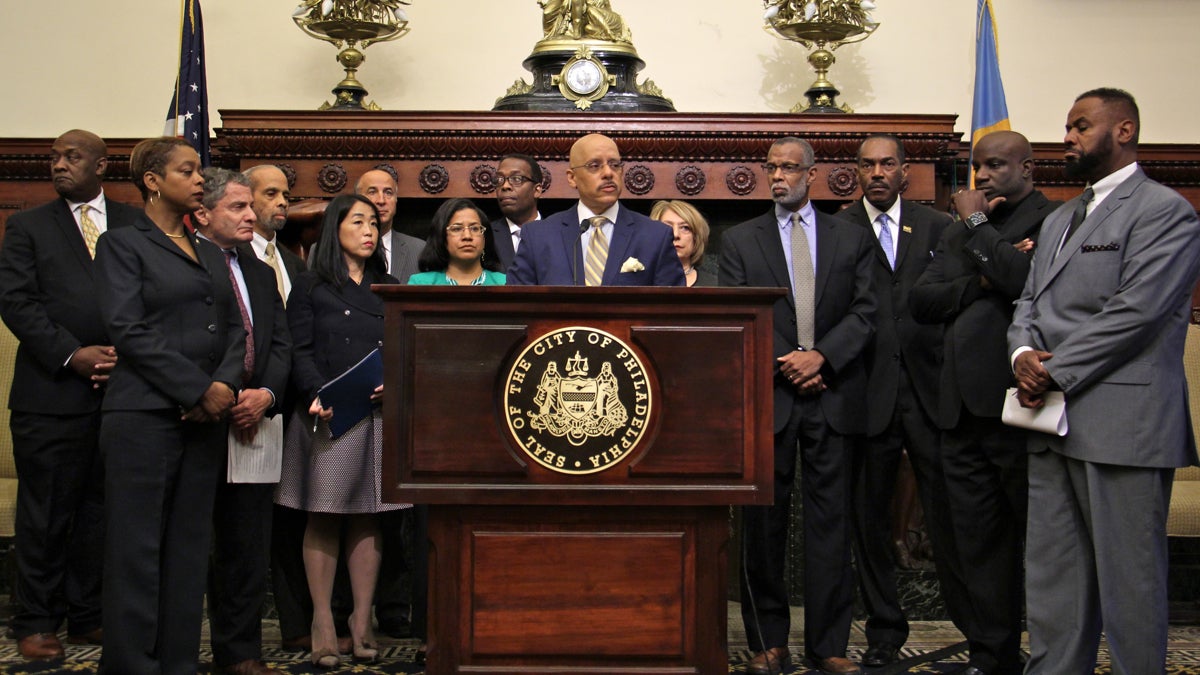Civic, health, religious leaders huddle on protecting Philly kids from lead-paint poisoning
Listen
Pennsylvania state Sen. Vincent Hughes (center) joins state and local lawmakers and community leaders in a call to action in response to reports of high lead levels in children. (Emma Lee/WHYY)
Children’s health advocates, clergy and lawmakers gathered in Philadelphia Monday to talk about the lead-paint problems that are making city kids sick.
In 2015, about 2,700 Philadelphia children had a blood test that showed a harmful level of lead.
By email, city spokeswoman Lauren Hitt said most of those tested had a lead level in the range of 5 to 9 micrograms per deciliter.
“The cutoff of 10 is the level at which most health departments (including the Philadelphia Department of Public Health) carry out remediation of lead hazards at home; below that, most health departments (including the Philadelphia Department of Public Health) educate parents about risks and recommend to pediatricians to monitor with additional testing,” Hitt said.
While health concerns in Flint, Michigan, were linked to unsafe pipes, in Philadelphia flaking lead paint in older homes is the problem that most causes lead poisoning.
Pennsylvania state Sen. Vincent Hughes, Democratic chairman of the Senate Appropriations Committee, called Monday’s meeting. He said, in just 24 hours, a great many concerned, important people came together to talk about solutions.
“Obviously, we are disappointed that the level of the problem is where it is,” Hughes said. “But we weren’t taking shots at anyone today.”
“This is a very much a resource issue, it’s very much a public awareness issue because that keeps the pressure on,” he added.
The Rev. Mark Kelly Tyler, senior pastor of Mother Bethel AME Church, said the city must be proactive in protecting children.
He suggested the city follow the Philadelphia Parking Authority mode.
“If you don’t pay your parking tickets, they boot your car,” he said. “If you don’t take care of the lead in the house, we should take the income. And if you want the rental income back, you’ve got to fix the problem. And if you don’t fix the problem, they should then move toward seizing the property and selling it.”
Tyler says the Flint crisis — and compelling coverage in the Philadelphia Inquirer and Daily News — has reawakened concerns about lead paint in Philadelphia, but the issue is not new.
Several years ago, the city passed a requirement that landlords certify their property is lead-safe for small children.
“The problem is a lot of landlords are not doing it,” said attorney George Gould of Community Legal Services. His group represents individual families as well as the Tenant Union Representative Network in Philadelphia.
Gould said he’s been fighting for 40 years to push building owners to clean up their properties.
“The sad part is that much of this happens in poverty areas, minority areas in the city,” he said.
During the meeting, Pennsylvania Sen. Art Haywood, Democratic chairman of the Senate Aging and Youth Committee, said the financial hit and penalties associated with not making a house lead-safe have to cost more than the expense of taking the necessary safety steps. Otherwise, he said, landlords won’t be motivated to make changes.
Lead poisoning can cause brain damage in very young children, as well as delays in speech and hearing.
Cuts in federal funding and too few inspectors have made it hard to identify and pursue landlords who ignore the rules, city officials said.
“To date there have been no fines or penalties issued, because while the 2012 law imposed requirements on landlords, it did not establish clear mechanisms for enforcement of those requirements,” wrote Hitt. “The city has been developing a mechanism for issuing code violation notices (tickets) to landlords who do not submit these certificates, and will begin issuing these tickets soon.”
WHYY is your source for fact-based, in-depth journalism and information. As a nonprofit organization, we rely on financial support from readers like you. Please give today.

